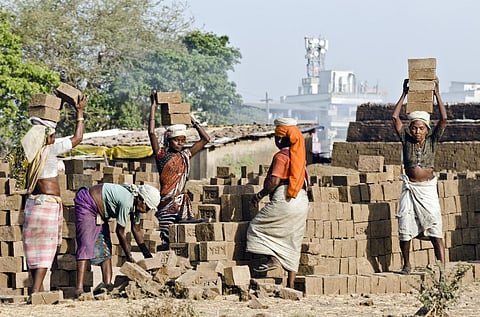

Rising heat and humidity due to global warming has prompted major loss in labour hours across the globe. India is one of the worst affected countries, according to a new study led by Duke University researchers.
As heat and humidity levels rise because of climate change, options for moving outdoor labour to cooler hours will dramatically shrink, leading to significant worldwide labour losses, the study found.
The study, published in Nature Communications December 14, 2021, projected that economic losses associated with this lost productivity could reach up to $1.6 trillion (Rs 1.6 lakh crores) annually if warming exceeds an additional 2 degrees Celsius relative to the present.
If that happens, labour losses in the coolest half of the day will exceed current losses in the hottest half.
Labour losses from heat exposure are spatially variable, with several countries in southwest Asia, South Asia and Africa that already experience per-capita, 12-hour workday labour losses, the study said.
India showed the largest heat exposure impacts on heavy labour among South Asian countries (greater than 101 billion hours lost / year), despite its modest average per-capita labour losses (162 lost hours a person a year).
The study projected that India, China, Pakistan and Indonesia — where larger fractions of the population work outdoors — will experience the biggest losses overall.
But 14 less populated countries could experience higher per-capita losses. These are Bangladesh, Thailand, Gambia, Senegal, Cambodia, United Arab Emirates, Bahrain, Qatar, Brunei Darussalam, Ghana, Togo, Benin, Sri Lanka and Nauru.
Critical jobs, such as agricultural work and construction work, will become almost impossible to perform safely during afternoon hours in the summer in many places, the study warned.
An increase in heat stress resulting from global warming is projected to lead to global productivity losses equivalent to 80 million full-time jobs 2030, according to International Labour Organization (ILO).
In this study, the researchers projected future labour losses for every country worldwide under a global temperature rise of 1°C, 2°C, 3°C and 4°C relative to the present.
The scientists used a blend of observation-based meteorological data and climate model projections of temperature and humidity to estimate humid heat exposure, current labour losses and projected future labour losses under additional warming.
This is the first study at the global scale assessing how effective it is to move heavy work to the cooler parts of the day as an adaptation to climate change.
In the current climate, approximately 30 per cent of global heavy labour losses in the workday could be recovered by moving it from the hottest hours of the day, the study said.
Luke Parsons, a climate researcher at Duke’s Nicholas School of the Environment, who led the study, said: “Our analysis shows that if we limit warming to within another degree of current levels, we can still avoid most worker productivity losses by moving heavy labour to the early morning hours. But if warming exceeds 1°C, that becomes much more difficult. It’s a sliding curve, and gets exponentially worse as the temperature rises.”